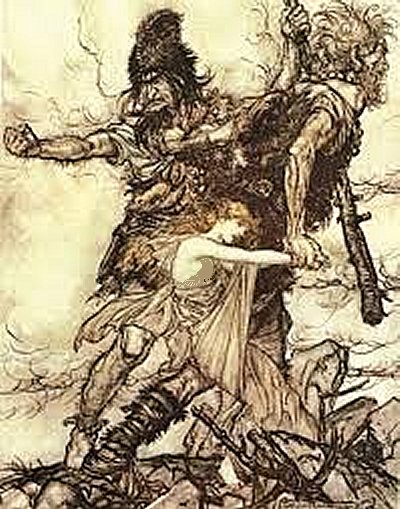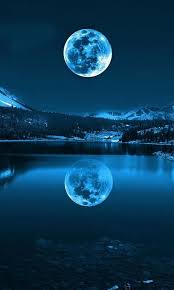 |
SPIRIT
LODGE
LIBRARY
Myth
& Lore
Page
3
|
(Main
Links of the site are right at the bottom of the page)
Some of the 86 pages in this Myth & Lore section are below.
The rest will be found HERE
Blue Moon
By Philip Hisock

Modern folklore has it that full
moons make for better parties and higher booking rates at mental
hospitals, but the studies I've heard about seem to deny the
relationship.
At least once this week you have
probably heard through the media that the old year (for purists,
the decade of the eighties) is going out on a blue moon. People
have been saying that "according to folklore" a second
moon in a calendar month is a "blue moon". So, they
say, this is the origin of the phrase "once in a blue moon."
Don't believe them! "Once in a blue moon" is old,
about 150 years old, but the age of the two-full-moons-in-a-month
meaning of "blue moon" is less than ten years. The
older meaning may be wishy-washy and the newer one solid and
technical, but don't let anyone tell you they have replaced
one with the other.
It's not rater to see two full moons
in a month. Because the moon and our calendar are not in sync
and all the months but February are longer than the moon's synodical
cycle, it happens about 7 times in every 19 years. That's every
33 months on average. Months have different lengths, so the
phenomenon moves around a bit. in 1999 there will even be two
"blue" moons. If you think about it, it's a little
like getting paid every second Friday and finding some months
you get paid three times instead of twice.
Meaning is a slippery substance.
The phrase "blue moon" has been around a long time,
well over 400 years, but during that time its meaning has shifted
around a lot. I have counted six different meanings which have
been carried by the term, and at least four of them are still
current today. So that makes discussion of the term a little
complicated.
The earliest references to the term
are in a phrase remarkably like early references to "green
cheese." Both were used as examples of obvious absurdities
about which there could be no argument. Four hundred years ago,
if someone said, "He would argue the moon was blue,"
the average 16th century man would take it the way we take,
"He'd argue that black is white." This understanding
of a blue moon being absurd (the first meaning) led eventually
to a second meaning that of "never." To say that something
would never happen when the moon turned blue was like saying
that it would happen on Tib's Eve (at least before Tib got a
day near Christmas assigned to her).
But of course, there are examples
of the moon actually turning blue; that's the third meaning--the
moon visually appearing blue. When the Indonesian volcano Krakatoa
exploded in 1883, its dust turned sunsets green and the moon
blue all around the world for the best part of two years. In
1927 a late monsoon in India set up conditions for a blue moon.
And the moon here in Newfoundland was turned blue in 1951 when
huge forest fires in Alberta threw smoke particles up into the
sky. Even by the 19th century it was clear that although visually
blue moons were rare, they did happen from time to time. So
the phrase "once in a blue moon" came about. It meant
then exactly what it means today--that an event was fairly infrequent,
but not quite regular enough to pinpoint. That's meaning number
four, and today it is still the main one.
I know of six songs which use "blue
moon" as a symbol of sadness and loneliness In half of
them the poor crooner's moon
turns to gold when he gets his love at the end of the song.
That's meaning number five, check your old Elvis Presley or
Bill Monroe records for more information.
Finally, in the 1980's, comes the
most recent meaning of blue moon--the second full moon in a
month. I first became aware of the new meaning of the term in
late May 1988 when it seemed all the radio stations and newspapers
were carrying an item on this interesting bit of "old folklore".
At the MUN Folklore & Language Archive we get calls from
all over, from people wondering about bits of folklore, and
in that month I got calls about blue moons. You see there were
two full moons that month. There hasn't been such a month since
then, until this month. December 1990 has full moons on the
2nd and the 31st.
In 1988 I searched high and low
for a reference to the term having this meaning, or for any
other term used to describe two moons in a single calendar month.
But it was all in vain. There just seemed to be no history to
this term. Through that research I uncovered the information
on other meanings of "blue moon." But not this blue
moon, meaning number six.
This month, with the new "blue
moon" coming on, I started getting calls again and I searched
harder this time. I had already exhausted all the usual sources
of historical and astronomical dictionaries, indexes of proverbial
sayings and the like. A brand new edition of the huge Oxford
English Dictionary had come out in the meantime, but even that
seemed to have nothing on this new usage. A new tack was called
for. Almost every day I used computer networks to contact other
folklorists around the world (in fact I send this column all
around the world each week on one of the networks), so I started
with them. But no one could give me an earlier use of the term
than the 1988 wire stories. I then turned to other computer
networks, for scientists and especially astronomers. Still no
luck. "Blue moon" seemed to be a truly modern piece
of folklore, masquerading as something old.
Then I remembered that the term was
a question in one of the Trivial Pursuit boxes, the "Genus
II edition," which was published in 1986. Trivial Pursuit
is a fine company for scholars--they keep all their files and
they can tell you the source of any bit of information in their
games. Yes, they told me, that question came from a certain
children's "Facts and Records" book, published in
1985. Where the authors of that book got it, no one seems to
know.
The term, used this way, must have
been very, very local before the publication of the children's
book, so local that it was never written down by amateur or
professional astronomers, or by the newspapers which might have
been searched by dictionary makers. it certainly was very rare.
Perhaps it was even made up by the authors of the children's
book as a safeguard against plagiarism. This is sometimes done
in order to be able to prove in a law court that a later work
has stolen from your own -- how else would they have gotten
something which you invented? Well, if that is what the authors
did, they have lost out because the term immediately entered
the folklore of the modern world and it has become as living
a meaning of the term "blue moon" as any of the earlier
ones. Since it has a kind of technical meaning which most of
the earlier meanings lacked, it will probably last a whole lot
longer, too. "Old folklore" it is not, but real folklore
it is.
*Philip Hisock is Archivist at the
Memorial University of Newfoundland Folklore and Language Archive.
|
|
|
|
|
|
|
|
|
|
|
|
Libraries
are on this row
|
|
|
INDEX
Page 3
(Main Section, Medicine Wheel, Native Languages &
Nations, Symbology)
|
|
INDEX
Page 5
(Sacred Feminine & Masculine, Stones & Minerals)
|
|
|
|
|
|
|
©
Copyright: Cinnamon Moon & River WildFire Moon (Founders.)
2000-date
All rights reserved.
Site
constructed by Dragonfly
Dezignz 1998-date
|
|